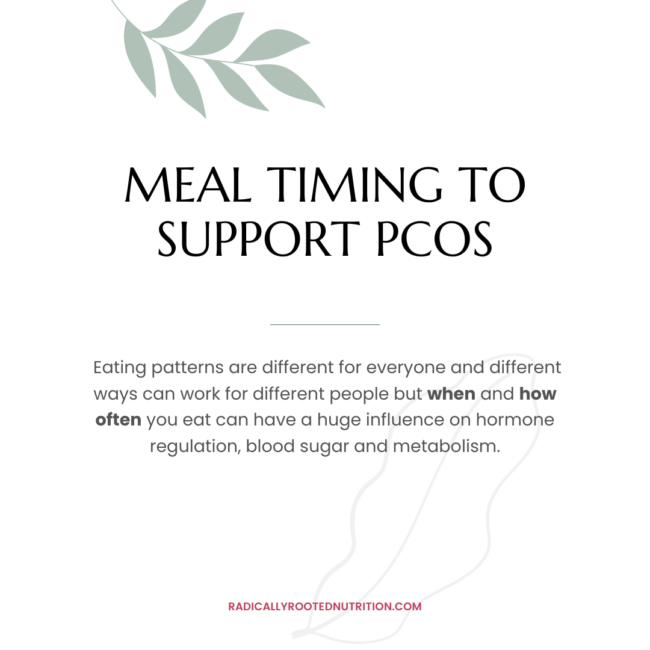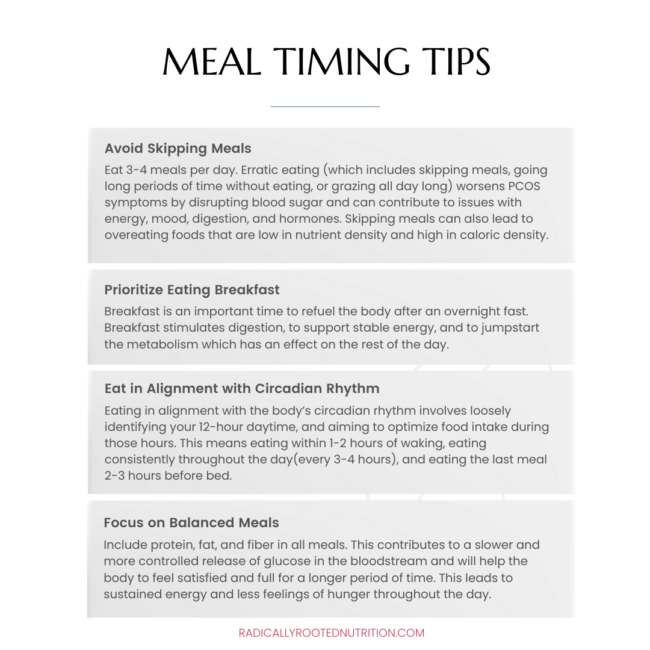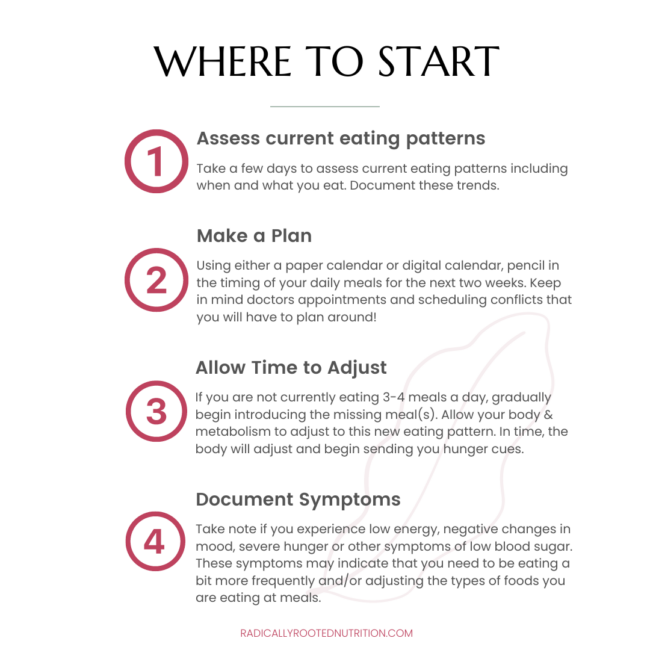Meal Timing to Support PCOS
Polycystic Ovary Syndrome (PCOS) is a common hormonal disorder that can be effectively managed with lifestyle changes. As many of us know, there is a lot involved when it comes to managing PCOS naturally. Diet and lifestyle interventions are incredibly personalized and complicated. One thing we know for sure is that meal timing is a big factor in supporting your body with PCOS. This includes how often you eat and your pattern of eating. Eating patterns are different for everyone and different ways can work for different people but when and how often you eat can have a huge influence on hormone regulation, blood sugar and metabolism.
When it comes to meal timing, there is so much differing information out there that it just gets overwhelming and confusing.
Let’s clear things up about meal timing to support PCOS.

Avoid Skipping Meals
Eat 3-4 meals per day. Breakfast, lunch, between-meal snack (depending on the timing between meals) and dinner. Erratic eating (which includes skipping meals, going long periods of time without eating, or grazing all day long) worsens PCOS symptoms by disrupting blood sugar and can contribute to issues with energy, mood, digestion, and hormones. Skipping meals can also lead to overeating foods that are low in nutrient density and high in caloric density. In general, I recommend prioritizing eating every 3 hours throughout the day to support stable blood sugar and hormones.
Prioritize Eating Breakfast
This is often the most common meal I see people skipping or neglecting. Breakfast is an important time to refuel your body after an overnight fast, to stimulate digestion, to support stable energy, and to jumpstart your metabolism which has an effect on the rest of your day.
One study done on women with PCOS found that those who had breakfast as their largest meal of the day experienced a 54% decrease in insulin resistance and a 50% decrease in free testosterone levels compared to those who had a small breakfast and their largest meal at dinner.
Both groups of women in this study ate the exact same diet, and the only difference was that one group had their biggest meal at breakfast and the other group had their biggest meal at dinner. This is huge!
There truly are so many benefits of eating breakfast including better energy levels, improved cognitive function, improved metabolic markers, and more. Research has also found that skipping breakfast increases levels of the stress hormone cortisol in the body and can lead to heart and metabolic diseases in some people.
Eating foods at breakfast that are high in protein and fiber can also help to balance your blood sugar, keep you full for longer, and improve insulin sensitivity. Many women are eager to cut carbs, but eating enough carbohydrates and focusing on the right type of carbs are essential to regulating your hormones.

Eat in Alignment with your Circadian Rhythm
Circadian rhythms are physical, mental, and behavioral changes that follow a 24-hour cycle. Your circadian rhythm works by helping to make sure that your body’s internal processes are optimized at various points during the day. Circadian rhythms are most well known for their impact on sleep, but they also influence hormones and bodily processes like hunger levels, digestion, weight, and stress management.
Eating in alignment with the body’s circadian rhythm involves loosely identifying your 12-hour daytime, and aiming to optimize food intake during those hours. This means eating within 1-2 hours of waking, eating consistently throughout the day(every 3-4 hours), and eating the last meal 2-3 hours before bed. The goal with this approach is to avoid disruption to our bodies’ natural processes that can occur from skipping meals earlier in the day and eating late at night.
Evidence has shown that many women with PCOS experience circadian rhythm dysfunction. So, aligning your pattern of eating with your circadian rhythm can help regulate hormones and improve PCOS symptoms.
Focus on Balanced Meals
Include protein, fat, and fiber in all meals. These macronutrients have a combined effect on blood glucose. The combined intake of protein, fat, and fiber in meals contributes This contributes to a slower and more controlled release of glucose in the bloodstream and will help the body to feel satisfied and full for a longer period of time. This leads to sustained energy and less feelings of hunger throughout the day. This is beneficial for preventing rapid spikes and drops in blood sugar levels. Protein and fat slow down the digestion and absorption of carbohydrates, while fiber directly slows digestion and does not contribute to blood glucose levels. Together, these macronutrients help in achieving a more stable blood glucose level, contributing to better long-term glucose control.

Where to Start with Meal Timing to Support PCOS
Set yourself up for success by making a plan.
- The first step is to take a few days to assess current eating patterns including when and what you eat. Document these trends.
- Next, using either a paper calendar or digital calendar, pencil in the timing of your daily meals for the next two weeks. Keep in mind doctors appointments and scheduling conflicts that you will have to plan around!
- Allow time to adjust. If you are not currently eating 3-4 meals a day, gradually begin introducing the missing meal(s). Allow your body & metabolism to adjust to this new eating pattern. In time, the body will adjust and begin sending you hunger signals and try not to rush or force it. In time, your metabolism will gradually adjust and begin sending you hunger cues.
- Document Symptoms. If you are already eating 3 meals per day, take note if you experience low energy, negative changes in mood, severe hunger or other symptoms of low blood sugar. These symptoms may indicate that you need to be eating a bit more frequently and/or adjusting the types of foods you are eating at meals. In general, eating around every 3-4 hours is a nice starting goal, but you should always follow your hunger cues and other symptoms too.
Remember that this will likely take some time, particularly if you’re currently skipping meals. Some trial and error will help you determine what works best for your body.
Bottom Line
In summary, there’s no one-size-fits-all approach to meal timing for PCOS, but starting the day with a balanced breakfast, eating consistently every 3-5 hours, and having an early dinner can support blood sugar stability, hormone balance, and overall health. Always consider personal hunger cues and consult with a Radically Rooted Dietitian for personalized help.



